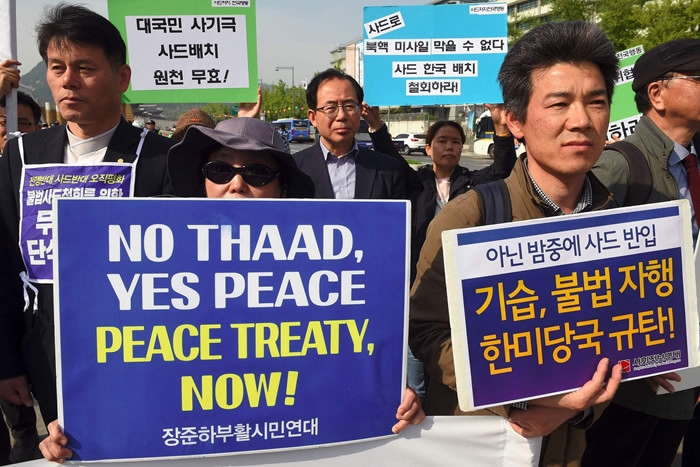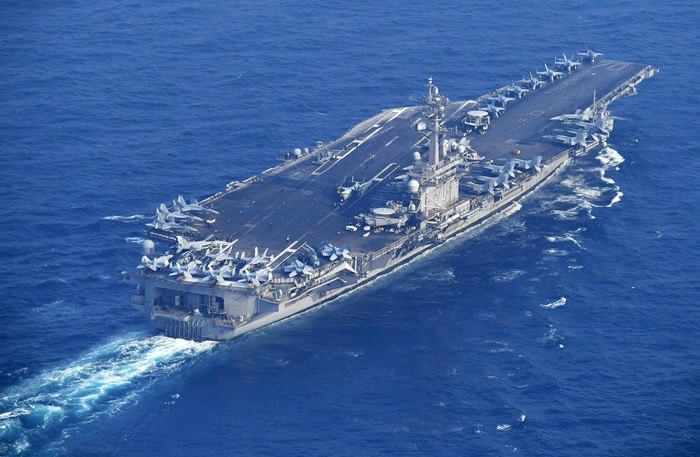Moon Jae-in, the new president of South Korea, will reconsider the deployment of the US Terminal High Altitude Area Defense (THAAD) system in the country and resolve the issue in the near future, Pan Heping, a Chinese expert in international relations, told CGTN on Wednesday.
Moon secured a sweeping victory over his conservative and centrist rivals in South Korea's presidential election on Tuesday, more than four years after a narrow defeat to his predecessor Park Geun-hye.
Park was impeached and removed from office in March amid a corruption scandal, which led to the early presidential election at a time of souring tensions on the Korean Peninsula and heated debates over the deployment of THAAD.

South Korean protesters hold placards during a rally against the deployment of THAAD near the US embassy in Seoul, South Korea on April 28, 2017. /VCG Photo
THAAD deployment to be reversed?
South Korea recently started the deployment of THAAD, which Washington says is needed to defend against missile threats from the Democratic People's Republic of Korea (DPRK).
However, the move led to protests among South Korean residents and faces resolute opposition from Beijing, which stresses THAAD would threat China's security and harm strategic balance in the region.
Some Chinese citizens launched a boycott of Lotte, a South Korean conglomerate that had agreed to host THAAD on its land.

There were few shoppers at a Lotte Mart in Wangjing area of Beijing, China on March 1, 2017. /CGTN Photo
Moon has cast doubt on THAAD on a number of occasions. As recently as last week, he stated that the THAAD deployment lacked "democratic process, an environmental assessment or a public hearing."
"One of the biggest problems with this THAAD deployment decision was that it lacked democratic procedure, and it has resulted in a wide division of the nation and aggravated foreign relations," he told The Washington Post.
But Moon promised to "fully consult with the US" on the issue if elected.
In his inaugural speech on Wednesday, the 64-year-old reiterated that he would have "serious negotiations" with China and the US on THAAD.
Moon Jae-in's inaugural speech as South Korean president
So, will the liberal president postpone or even reverse the deployment of THAAD?
Pan said Moon will give "cautious consideration" to the issue, which has affected South Korea's national security and economic interests.
Pan indicated that controversies over THAAD were also a reason for Park's fall from the presidency, leading to dramatic changes in the country's political landscape.
"In the face of these situations, the new South Korean president will reconsider the issue," he said. "The deployment of THAAD in South Korea is something all Northeastern Asian countries care about."
He stressed that the issue matters to South Korea's relations with both China – its largest trading partner – and the United States – its most important ally.
The new president is likely to reevaluate whether to maintain THAAD's deployment in South Korea and resolve the issue within a short period of time, he added.
Positive signal for China-South Korea relations
Chinese President Xi Jinping on Wednesday congratulated Moon on his election as South Korean president.
Since the establishment of diplomatic ties 25 years ago, relations between the two neighbors have enjoyed in-depth development at all levels thanks to the joint efforts of the two sides, Xi stressed.
"I would like to work with you to ensure the development of Sino-South Korean ties for better benefits of the two countries and peoples," the Chinese president said.

Moon Jae-in heads to the Blue House after taking an oath as South Korea's 19th president at the National Assembly building in Seoul, South Korea on May 10, 2017. /VCG Photo
From Pan's perspective, despite twists and turns in the development of bilateral relations, ties have progressed after each new South Korean president assumed office. He believes the tradition will repeat itself under President Moon.
"Under the complicated situations in Northeast Asia, South Korea will explore a new way to develop its relations with China," Pan said. "In order to maintain security in its surroundings, the country will strive for a coordinated stance with China on regional security."
Under the leadership of the new president, South Korea will try to play a bigger role in maintaining security and stability in the Northeast Asian region, he suggested.
"China-South Korea relations will undergo a process of slow recovery and development," Pan predicted.
Moon to cool tensions on Korean Peninsula
Moon, who served as chief of staff to late liberal President Roh Moo-hyun, favors dialogues with the DPRK and the "sunshine policy" of trying to expand inter-Korean cooperation.
In his inaugural speech, the new president said he will visit Pyongyang under the right conditions. "I will do everything I can to build peace on the Korean Peninsula," he added.
What implications will Moon's inauguration pose for tensions on the Korean Peninsula?

DPRK leader Kim Jong Un attends a combined fire demonstration of the services of the Korean People's Army in celebration of its 85th founding anniversary on April 25, 2017. /VCG Photo

American aircraft carrier USS Carl Vinson heads to the vicinity of the Korean Peninsula for a joint drill with the South Korean Navy on April 29, 2017. /VCG Photo
Pan said the risk of military confrontation between the DPRK and South Korea had reached a new height in recent months, as Pyongyang conducted a succession of missile tests while Washington and Seoul showed little sign of reconciliation, both in rhetoric and joint naval drills.
"Should a strategic misjudgment occur, the war could be rekindled," said Pan. "It's highly possible." He added that a new Korean War would pose an immense threat to the security of South Korea and greatly impede the country's development.
In this sense, Moon will place a high priority on readjusting policies toward the DPRK, he stressed. "I think the new South Korean president will make contributions on cooling tensions on the Korean Peninsula."
In Pan's view, Moon will take a series of measures to defuse tensions after taking office. "Security tensions on the Korean Peninsula will cool down over a certain period. I'm optimistic about the trend," he said.
Related Stories:









